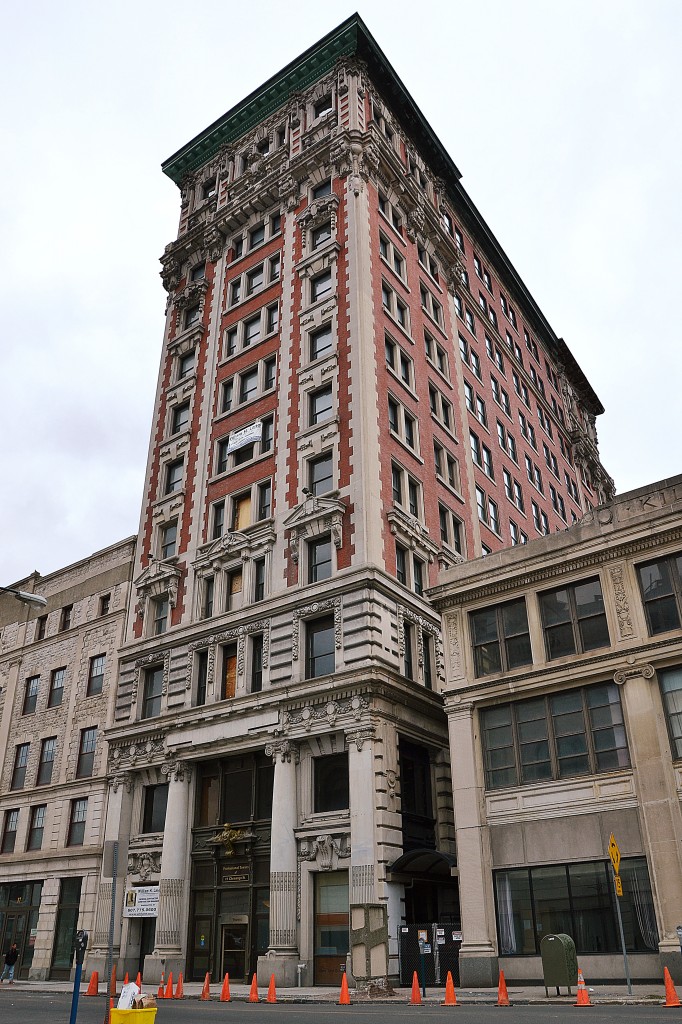
For Binghamton University students pressed for a place to live next year, Printing House Apartments may be the answer.
The new complex is made up of three adjacent apartment buildings: A three-story building at 21 Chenango Street, an already-renovated five-story building at 25 Chenango Street and the 12-story Press Building at 19 Chenango Street.
The floor plans show that the new buildings will have singles, doubles, triples and five-person apartments with personal bathrooms for each tenant. Starting rent ranges from $775 a month for five-person apartments to $1149 a month for a single. They have just begun accepting applications for the 2015-2016 school year.
According to Robin Rains, the managing director of business development and asset management of Campus Evolution Villages, the company currently overseeing the complex, the renovations for 21 Chenango Street are expected to be completed by August 2015. The Press Building will be completed by Fall 2016, but a portion of the building may be completed for the start of next year as well. Together, the three buildings will be able to house about 300 people.
Lynn Mugodo, the president of Off-Campus College Council (OC3) and a senior double-majoring in political science and philosophy, politics and law, said the number of students moving Downtown has been increasing steadily over the past few years and that expansion would help in the long run.
“I think Downtown luxury housing will help alleviate the pressure of housing on campus that the increase in enrollment is likely to cause,” Mugodo wrote in an email. “Students having an alternative option off campus will ensure that campus does not become overcrowded.”
Of the nearly 13,000 undergraduate students enrolled at BU, approximately 7,000 live off-campus. Steven Molinari, a senior majoring in political science and the vice president of OC3, said that while an increase in off-campus housing options is necessary, it is important to expand on-campus resources as well.
“Off Campus College Council is always concerned for the well-being of our constituents,” Molinari wrote in an e-mail. “We should be focused on improving our organizations such as OCCT so that when future students arrive, our University will be prepared.”
Amy Pollock, the assistant director of housing for Residential Life, offered a statement on behalf of ResLife saying that off-campus housing had little effect on the amount of students choosing to live on campus.
“Residential Life continues to house a large number of our returning students on campus, all freshmen, as well as many new transfer students,” Pollock wrote. “We have no plans to build new, on-campus housing at this time. We will continue to partner with Admissions to be sure we are able to meet the needs of our students who wish to live on campus.”
The Press Building is considered a historic building by New York State and its basement once housed a massive printing press. It was built in 1904 to house the Binghamton Press newspaper. Since the relocation of the Binghamton Press, the building has been used for various office spaces.
In 2010, the building was water damaged after an effort to put out a fire at the Midtown Mall, prompting the restoration project by a local developer. The building was sold for $2.1 million to 19 Chenango Empire LLC, while 21 and 25 Chenango Street were sold for $500,000 and $1 million to 21 Chenango Empire LLC and 25 Chenango Empire LLC, respectively.
According to Rains, Printing House Apartments is the next step in expansion for both the University and the city.
“The University is focused on Downtown and a lot of the kids like being Downtown,” Rains said. “Given the supply and demand in the market and the fact that the University is growing, it just looks like a logical thing to do.”


